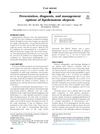 9 citations,
December 2018 in “JAAD case reports”
9 citations,
December 2018 in “JAAD case reports” Lipedematous alopecia involves a thickened scalp and hair loss, with limited effective treatments available.
 38 citations,
December 2012 in “Journal of Cutaneous Pathology”
38 citations,
December 2012 in “Journal of Cutaneous Pathology” EVG staining is a valuable, simple, and cost-effective method for diagnosing various skin conditions in dermatopathology.
 October 2024 in “Journal of Education Health and Sport”
October 2024 in “Journal of Education Health and Sport” Alopecia areata treatment should be personalized, using topical or systemic therapies based on severity, with promising options like JAK inhibitors needing more research.
 60 citations,
October 2005 in “Experimental Dermatology”
60 citations,
October 2005 in “Experimental Dermatology” Zinc can both inhibit and stimulate mouse hair growth, and might help recover hair after chemotherapy.
99 citations,
September 2007 in “The American journal of pathology” Chemotherapy damages hair follicles, causing hair loss and other cellular changes.
 13 citations,
August 2020 in “Mayo Clinic proceedings”
13 citations,
August 2020 in “Mayo Clinic proceedings” Women with lichen planopilaris often have thyroid disease, depression, anxiety, and may respond to treatment with slowed disease progression.
3 citations,
November 2012 in “American Journal of Analytical Chemistry”  106 citations,
July 2013 in “Advances in wound care”
106 citations,
July 2013 in “Advances in wound care” UV radiation can help sterilize wounds and promote healing but requires careful use to avoid damaging cells.
2 citations,
February 2023 in “International journal of molecular sciences” Body hairs can be used in forensic science and toxicology like scalp hair.
 2 citations,
May 2020 in “Journal of visualized experiments”
2 citations,
May 2020 in “Journal of visualized experiments” Controlled light treatment in mouse skin speeds up healing and hair growth.
1 citations,
January 2023 in “Frontiers in genetics” Certain genetic markers linked to wool quality in Rambouillet sheep were identified, which can guide better breeding choices.
 52 citations,
November 2013 in “European Journal of Pharmaceutical Sciences”
52 citations,
November 2013 in “European Journal of Pharmaceutical Sciences” Chitosan-decorated polymersomes improve finasteride delivery for hair loss treatment.
 14 citations,
January 2008 in “Medical mycology”
14 citations,
January 2008 in “Medical mycology” Canadian porcupines in a Japanese zoo passed a skin fungus to each other.
 16 citations,
July 2023 in “Acta biomaterialia”
16 citations,
July 2023 in “Acta biomaterialia” The study developed a new way to create hair-growing tissue that can help regenerate hair follicles and control hair growth direction.
 September 2023 in “Irish Journal of Medical Science (1971 -)”
September 2023 in “Irish Journal of Medical Science (1971 -)” About 61% of women who had COVID-19 experienced hair loss afterward.
 249 citations,
April 2002 in “The FASEB journal”
249 citations,
April 2002 in “The FASEB journal” Human skin can make serotonin and melatonin.
 5 citations,
January 2017 in “Endocrinology”
5 citations,
January 2017 in “Endocrinology” Genetic defects in testosterone production can cause hormonal and developmental disorders, and more research is needed to understand androgen regulation and develop safer treatments.
 5 citations,
October 2013 in “Endocrine”
5 citations,
October 2013 in “Endocrine” Blood tests can detect ovarian Leydig cell tumors when scans don't, and surgery can confirm and treat these tumors.
 117 citations,
May 2017 in “Human Reproduction Update”
117 citations,
May 2017 in “Human Reproduction Update” The update highlights that non-classic congenital adrenal hyperplasia is common in women with excess male hormones, requires specific hormone tests for diagnosis, and has various treatment options depending on age and symptoms.
 17 citations,
December 2020 in “Journal of Genetic Counseling”
17 citations,
December 2020 in “Journal of Genetic Counseling” Genetic counselors should be culturally skilled and aware of transgender patients' unique health risks and needs.
 340 citations,
September 2014 in “PLOS Genetics”
340 citations,
September 2014 in “PLOS Genetics” The study found that in Latin America, ancestry varies by location, influences physical traits, and affects how people perceive their own heritage.
 26 citations,
June 2012 in “The Journal of Obstetrics and Gynecology of India”
26 citations,
June 2012 in “The Journal of Obstetrics and Gynecology of India” Most skin changes during pregnancy are harmless and temporary, but some can risk the fetus and need careful treatment.
 19 citations,
April 2015 in “Developmental Dynamics”
19 citations,
April 2015 in “Developmental Dynamics” The conclusion is that skin and hair patterns are formed by a mix of cell activities, molecular signals, and environmental factors.
1 citations,
January 2024 in “Journal of personalized medicine” Hormonal imbalances during menopause may significantly contribute to Frontal Fibrosing Alopecia.
2 citations,
November 2022 in “Oxidative Medicine and Cellular Longevity” Exosomes from dermal papilla cells help hair follicle stem cells grow and survive.
54 citations,
September 2012 in “The journal of investigative dermatology/Journal of investigative dermatology” Vitamin A affects hair loss and immune response in alopecia areata.
 50 citations,
March 2021 in “Journal of investigational allergology & clinical immunology”
50 citations,
March 2021 in “Journal of investigational allergology & clinical immunology” Dupilumab is being tested for many new skin, respiratory, and gastrointestinal conditions.
 10 citations,
January 2003 in “Seminars in reproductive medicine”
10 citations,
January 2003 in “Seminars in reproductive medicine” The article explains how to identify and treat excessive hair growth in women, which can be distressing and may signal other health problems.
 November 2022 in “Gigascience”
November 2022 in “Gigascience” A specific genetic deletion in goats affects cashmere yield and thickness.
 25 citations,
April 2021 in “The EMBO Journal”
25 citations,
April 2021 in “The EMBO Journal” Hair follicle stem cells help maintain skin health and could improve skin replacement therapies.























